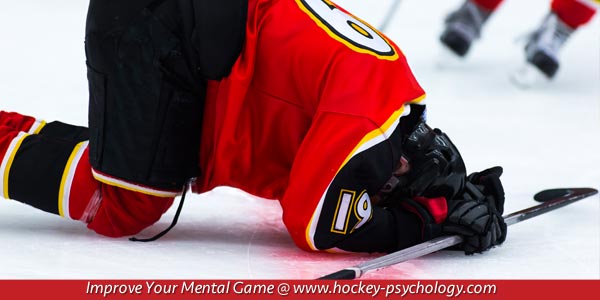
How Mental Lapses Negatively Affect Teams
Have you ever competed in a game where you were so afraid to make a mistake?
You could feel the tension in your muscles increase and your heart beating a little faster. Your palms were sweaty and you couldn’t seem to stop thinking about messing up.
You performed so tentatively that you hoped the ball or puck wouldn’t come your way. Then, when it was time to perform, the very thing you feared happened… you messed up.
The fear of messing up or making mistakes is a common issue for athletes in sports, which can lead to a mental lapse.
A mental lapse happens when unwarranted distractions divert your attention away from playing the game. Instead, your mind is filled with unproductive, negative thoughts.
An athlete performs optimally when he is focused on a strategy or merely playing his “game.” When a player begins to focus on what he fears may happen, that focus then unconsciously becomes a target.
Even though that player wants to avoid what he fears, quite often it becomes the target he hits (self-fulfilling prophecy).
The Edmonton Oilers, currently 3-10-2, have lost five straight games and were shut out in the last two games. The Oilers have not made the playoffs since the 2005-06 season and have the worst record in the Western Conference this season.
Oiler center Sam Gagner has noticed the effects of his team’s mental lapses and hopes their three day break will help the Oiler’s regain their focus, “It’s important, especially mentally, to recharge your batteries and focus on what we need to do to get a win here. Guys have been working hard and trying to do the right things, but mental lapses cause you to find ways to lose games. It’s nice to have a little time to get back to square one and go from there.”
Gagner hit on several points regarding mental lapses and how to overcome them:
- Understand fear – Fear affects your performance in a number of ways. Fear diverts your attention from the process of performing well and adversely affects your confidence. Fear also affects you physically by increasing tension in your muscles, increasing respiration and reducing energy within the body. Recognition of these signs can provide you with early warning signs and help you refocus and reconnect with a positive goal.
- Take a break – A time-out or slight break in action can help interrupt your mind and provide the opportunity to focus on the necessary performance cues during games. You can use a phrase like “focus” or “snap out of it” to help you refocus.
- Focus on your game – You have been successful at some point in your athletic career. You need to focus on your strengths, your game plan or the things that help you play successfully. When you compete from your strengths, you gain a sense of control over your game and help minimize focusing on what you fear and potential negative outcomes.
Check Out Our Hockey Mental Game Programs
Related Articles on Hockey Mental Game:
- Making Comparisons Hurts Hockey Confidence
- Complaining About Playing Time Hurts the Team
- How to Create a Winning Mindset for Hockey
*Subscribe to The Sports Psychology Podcast on iTunes
*Subscribe to The Sports Psychology Podcast on Spotify
The Mental Edge for Hockey

The Mental Edge for Hockey teaches you proven and simple mental game strategies so you can overcome fear of failure, lack of confidence, slumps or poor composure, take your practice game to competition, and boost your confidence in hockey. You learn simple, actionable mental game strategies to help you perform at your peak!
I’ve worked with athletes for 30 plus years – and know the top challenges that undermine performance when you perform in games. Now you can tap into my expertise and experience in coaching hockey players on the mental game.
In this program, you’ll learn the TOP 10 mental training lessons for hockey players – the same strategies I teach one-on-one athletes I coach on the mental game. My clients pay thousands of dollars for personal coaching, but now you can have the same strategies to improve your mental game – at a fraction of the price.
Leave a Reply